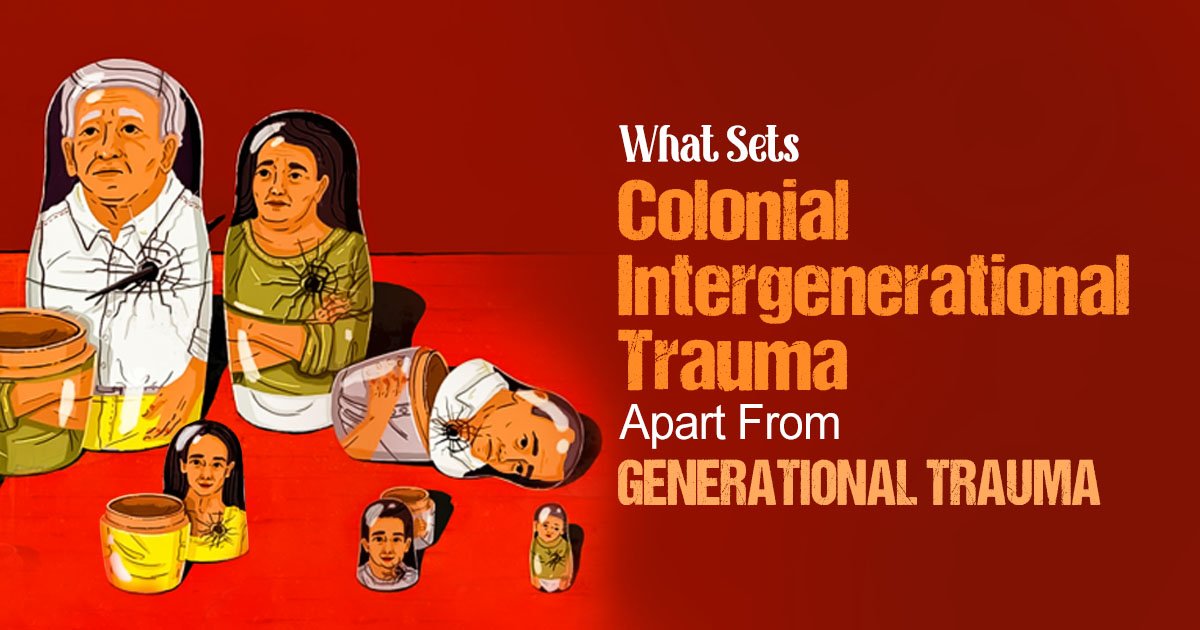In a recent interview, Dr. Samah Jabr, head of the Mental Health Unit at Palestine’s Ministry of Health talked to the Indian publication The Hindu about authentically measuring and laying down the colonial intergenerational trauma definition to highlight the violence and trauma experienced by people inhabiting the Gaza Strip, especially the Palestinian population.
Jabr’s interview highlighted how continued colonization from one generation to another causes deeply rooted and permanent changes in the lives of communities oppressed by colonialism. The period of subordination that signifies colonialism leaves indelible marks that can be noticeable amongst future generations, particularly colonial intergenerational trauma.
What Is Colonial Intergenerational Trauma?
Colonial intergenerational trauma refers to the long-lasting emotional, psychological, and cultural injuries which are handed over generations as a result of oppressive and exploitative colonization. It covers the psychological and emotional wounds inflicted upon people and societies who experience the direct violence of colonization, such as displacement, assimilation, cultural stripping off, loss of identity, or systemic abuse.
Colonial intergenerational trauma does not merely end with the first group which experienced it; rather, it carries through other generations making them mentally, emotionally, and socially unwell. This type of hurt interrupts normal culture transmission methods, including self-identity perpetrating pain across time.
Signs Of Colonial Intergenerational Trauma
To identify colonial intergenerational trauma, there is a need for one to recognize a range of feelings, behaviors and mental signs. Common indicators include deep sadness caused by loss or grief and cultural inconspicuousness. These individuals may suffer PTSD, anxiety disorders, depression, or chronic hopeless due to a background riddled with historical trauma faced by their ancestors.
There are several ways in which this traumatic experience can be seen in family set-ups. The first signs include disrupted and strained community relationships, and facing difficulties in forming positive self-identities. Consequently, substance abuse or violence among other self-destructive habits are ways some people deal with the ongoing impact arising from colonial intergenerational trauma.
Examples of Colonial Intergenerational Trauma
Common examples of colonial intergenerational trauma include:
- Forced Cultural Displacement: Removal of indigenous communities from ancestral lands disrupts cultural practices.
- Systemic Oppression: Discriminatory policies and unequal resource distribution perpetuate inequalities.
- Language Loss: Suppression of native languages erodes linguistic diversity and communication.
- Historical Injustices: Traumatic events like massacres and forced labor by colonizing powers.
- Forced Assimilation Trauma: Attempts to erase cultural identities lead to lasting impact.
- Economic Exploitation: Colonial economic systems result in socio-economic disparities.
- Family Structure Disruption: Separation, forced labor, and breakdown of traditional families cause trauma.
- Educational Suppression: Denied education and distorted historical narratives impact knowledge transmission.
- Health Disparities: Limited healthcare access and exposure to diseases contribute to generational health challenges.
- Spiritual Practices Loss: Suppression of indigenous beliefs impacts spiritual well-being across generations.
Colonial Generational Trauma vs. Intergenerational Trauma
While colonial generational trauma and intergenerational trauma have similarities, they are different as far as their causes and extent are concerned. The latter refers to passing down trauma between family members who might have seen wars, physical or mental abuse, or natural calamities. However, the former specifically comes from historical and systemic injustices exercised against indigenous or colonized people by colonizing powers.
Intergenerational trauma is common among members of a particular family or ethnic group due to various traumatic experiences that have occurred within them. History, on the other hand, shows that whole communities may be affected by colonial generational trauma. This distinction between two types is important in devising tailor-made intervention strategies towards healing and restoring communities’ mental well-being.
Tips For Healing Colonial Intergenerational Trauma
Consider the following tips for healing colonial intergenerational trauma:
1. Acknowledgment And Validation
Healing colonial intergenerational trauma comes with the acknowledgement that there has been some form of suffering. Validating the experiences of these individuals and communities who have been victims helps them feel understood and get into a space where they can heal.
2. Cultural Revitalization
Cultural reawakening such as embracing one’s language, traditional practices, etc. among others is one way of regaining lost identity in the wake of colonial intergenerational trauma. Cultural expression serves as an important tool in the recovery process and even asserting oneself again.
3. Education And Awareness
It is important to promote an awareness of colonial history and its lasting effects, as it can help people gain more knowledge about the past and the very colonial intergenerational trauma definition. This fosters understanding and empathy. Education should be made a serious component in dismantling cycles of ignorance and challenging systems that support colonial intergenerational trauma perpetuation.
4. Community Support And Solidarity
It is possible to create a sense of belonging-ness and shared strength by building supportive communities and fostering solidarity among affected groups. Healing collectively engages individuals to overcome the isolation that often comes with colonial intergenerational trauma.
5. Therapeutic Interventions
Taking into account accessible mental health services and culturally sensitive therapeutic interventions equip individuals or even whole communities with medical facilities and self-help mechanisms for navigating intergenerational trauma.

